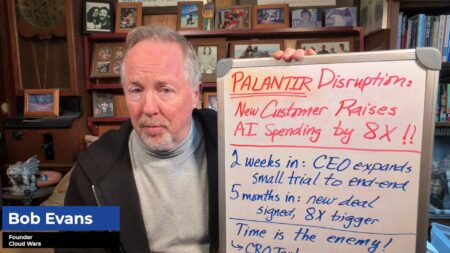Microsoft’s Frontier Firm strategy shows how large-scale Copilot adoption is reshaping enterprise operations and accelerating customer AI adoption.
A cheerful end-of-year Cloud Wars Minute filled with gratitude, humor, and holiday spirit.
BNY Mellon partners with Google Cloud to bring AI capabilities to all employees, aiming to deliver faster, richer insights.
AJ Ansari joins John Siefert to examine how leaders can cut through AI hype, choose the right problems to solve, and bring home measurable value from the AI Agent & Copilot Summit.
Google Cloud’s deal with NATO marks a significant move into the defense sector, long dominated by AWS and Microsoft.
Oracle and Google Cloud surge into a tie for #2 among the fastest-growing cloud vendors, as Cloud Wars earnings reveal sustained momentum, accelerating growth, and strong AI-driven demand across the market.
Nancie Calder provides insights on the upcoming AI Agent & Copilot Summit, including how attendees can optimize their time at the event.
Oracle’s Q2 numbers make one thing clear: customers are betting their future cloud and AI workloads on Oracle at a scale no competitor is matching.
Mistral Large 3, now on Azure, offers full openness via Apache 2.0 licensing and excels in enterprise tasks.
Google Cloud CTO Will Grannis urges enterprises to reverse-engineer AI strategies around customer needs, not technology, for deeper transformation.
Paragon Films’ Kenny Mullican defines his role as a programming committee board member for the AI Agent & Copilot Summit and what attendees can expect from the event this year.
IBM and Cisco are collaborating to build long-distance quantum networks — early steps toward a future quantum internet that will both unlock massive computational power and safeguard us from quantum-enabled cybersecurity threats.
ServiceNow and Palantir are locked in a high-stakes battle to dominate the AI platform market and define the future of enterprise software.
An Analyst-Agent Pair, augmented by agent orchestrators, drives greater human and business productivity. AIS leaders shares key drivers and metrics of success.
JLL exec explains how her firm has trained its workforce for AI, its governance practices, and the importance of a clearly defined AI strategy.
During the recent earnings call, CEO Marc Benioff emphasized a growth mindset for Salesforce and shared details and commentary from Q3.
Microsoft Copilot users on WhatsApp must transition to Microsoft-owned platforms by Jan 15 due to WhatsApp policy updates.
Business leaders are taking charge of AI strategies, shifting enterprise focus from IT-led to CEO-led end-to-end transformations.
Anywhere Real Estate’s Mary McAnally provides insights from her involvement with the AI Agent & Copilot Summit and what attendees can expect.
Salesforce’s completed acquisition of Informatica strengthens its agentic AI strategy by adding deep data governance, catalog, and quality capabilities to deliver cleaner, more connected, and more reliable AI outcomes.
























